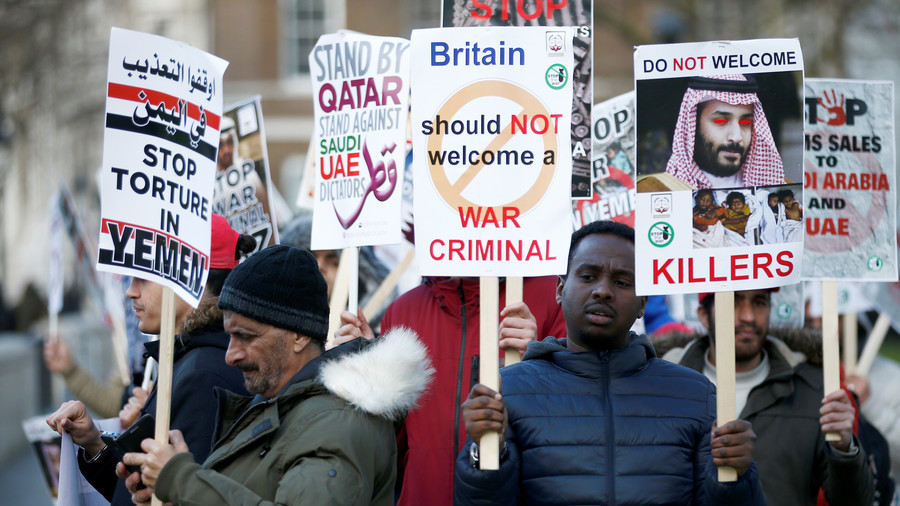'Short of engaging in combat': UK has Al Saud's back in Yemen war
Dan Glazebrook is a freelance political writer who has written for RT, Counterpunch, Z magazine, the Morning Star, the Guardian, the New Statesman, the Independent and Middle East Eye, amongst others. His first book “Divide and Ruin: The West’s Imperial Strategy in an Age of Crisis” was published by Liberation Media in October 2013. It featured a collection of articles written from 2009 onwards examining the links between economic collapse, the rise of the BRICS, war on Libya and Syria and 'austerity'. He is currently researching a book on US-British use of sectarian death squads against independent states and movements from Northern Ireland and Central America in the 1970s and 80s to the Middle East and Africa today.

London was not a coincidental choice of Saudi Arabia’s new Crown Prince for his first official visit to the Western world. The UK has been deeply involved in the brutal war the Saudis are waging on Yemen.
When it began three years ago this month, the then-foreign minister Philip Hammond explained that Britain’s policy was to support the war “in every practical way short of engaging in combat.”
He has been true to his word. Since then, not only has Britain licenced over £6 billion ($8.3 billion) worth of military equipment, but has supplied no less than 166 personnel to assist the Saudi arms forces, including several officers deployed in the air-force control room, advising on targeting. Britain provides training to Saudi air-force pilots and battlefield skills to Saudi infantry – including, it was recently revealed, training specifically tailored to Yemeni terrain. On the diplomatic front, the UK has repeatedly used its position on the UN Security Council to block UN investigations into war crimes committed by the Saudi-led coalition, much to the disgust of many of its European partners. In sum, Yemen is being destroyed by British-made missiles, dropped from British planes, by British-trained pilots.
As the eminent international lawyer Philippe Sands QC told a UK parliament select committee, – as the UK government continues to do – “that the United Kingdom is not involved” in the Yemen war. This involvement is not limited to mere support, however, what is becoming increasingly clear is that Britain is playing a leading role in the war’s strategic direction.
In late 2016, the “Yemen Quartet” was set up – a ministerial-level grouping of the four main powers responsible for the war – the UK, the US, the KSA, and the UAE. Their meetings have been sporadic, but over the past four months, they have become much more frequent, usually at Britain’s behest. But what is particularly noteworthy is that every single major strategic shift in the war’s execution in recent months has coincided with a meeting of the Quartet called by Boris Johnson. Clearly, the Foreign Office mandarins responsible for planning the Yemen war have been working overtime.
On November 29, Theresa May was in Riyadh, meeting with King Salman. At the same time, Johnson was hosting a meeting of the Quartet, attended by the foreign ministers of the UAE and Saudi Arabia, along with the US under-secretary of state. That very day, the forces of former president Ali Abdullah Saleh turned on their erstwhile allies in the Houthi-led Ansar Allah movement in what was heralded as the most significant shift in the war to date.
A few days later, on December 2, Saleh announced his formal defection to the Saudis, a move immediately followed by the launching of a new offensive aimed at the Houthi-held port city of Hodeidah under the auspices of a newly created military alliance between the UAE and the Saudis. Saleh’s defection was supposed to tip the balance against the Houthis, but his assassination two days later left his forces in disarray, allowing the Houthis to more firmly secure the areas under their control.
Nevertheless, the move had clearly been well coordinated with the powers waging war on Yemen, with intense Saudi airstrikes immediately launched in support of Saleh’s move against the Houthis. Meanwhile, the Saudis wanted to know that the offensive on Hodeidah – which had been vigorously opposed by aid agencies as likely to create a famine, and had even been blocked by President Obama when suggested the previous year – had the blessing of their Anglo-American sponsors.
The simultaneous meetings in London and Riyadh were precisely such a demonstration of that support. Less than two weeks after this meeting, and just four days into the new Red Sea offensive, Boris Johnson was in Abu Dhabi, discussing the Yemen war with the most powerful figures in Saudi Arabia and the UAE, their Crown Princes Mohammad bin Salman and Mohammad bin Zayed, followed by another meeting of the Quartet.
On January 23, the Quartet met again, this time in Paris, and again at the instigation of Boris Johnson. This came hot on the heels of the UN’s humanitarian response plan published three days earlier, which explained that the war had driven a further one million people to brink of famine since last year (leaving a total of eight million facing extreme malnutrition), and pushed another 3.5 million to dependence on aid, reaching a total of over 22 million – three-quarters of the population.
Clearly a PR offensive was going to be necessary. The groundwork had already been laid by the Saudi’s “Yemen Comprehensive Humanitarian Operations” plan, announced to the media the day before the Quartet meeting by a British PR company made up of former employees of the disgraced Bell Pottinger. The plan, which proposes to tighten up the blockade of Houthi-controlled ports – a blockade which is already helping to starve 130 children to death every day – essentially dresses up new war crimes as nothing more than heartfelt philanthropy.
Just three weeks later, on February 15, Johnson called another meeting of the Quartet – attended for the first time by US Secretary of State Rex Tillerson. This meeting occurred as coalition forces had been making slow but steady progress through Hodeidah province and were poised to take their battle to Hodeidah city itself. Once again, such a devastating move for the Yemeni population meant all four powers sought reassurance that the planned slaughter had the blessing of all the others at the highest governmental level.
The following day, the UK put forward a motion to the Security Council praising Saudi Arabia and the UAE for their humanitarian efforts in Yemen, and on February 20, the Emirati press announced that the push on Hodeidah city would begin within days, to be led by Saleh’s nephew. The four protagonists were united in their plans to intensify the strangulation of the Yemeni people.
The reasons for this deep British determination to wage war on Yemen go back over a century, when Britain decided to help the Saudi family secure their rule of the peninsula in the knowledge that their sectarianism and lack of popular legitimacy would make them forever dependent on outside colonial support. The one potential thorn in the side to this plan has always been Yemen, whose population outnumber those of every other country on the peninsula put together, and whose historic civilization appears to give the Sauds an inferiority complex.
The British have always understood that an independent Yemen is the greatest threat to Western domination of the Arab peninsula, and have consistently sought to smash the possibility every time it rears its head. This week's meeting shows that even the obliteration of the entire country is deemed acceptable in pursuit of this goal.
The statements, views and opinions expressed in this column are solely those of the author and do not necessarily represent those of RT.




0 Comments:
Post a Comment
Subscribe to Post Comments [Atom]
<< Home